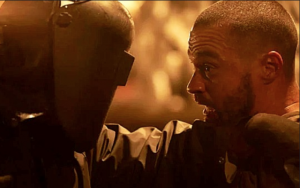RANDOM ACTS OF VIOLENCE: 3 ½ STARS. “asks why we view cruelty as entertainment.”
 True crime stories, retold as police procedurals, are television and podcast staples. Millions of people make a date every Friday with “Dateline” for a breathless retelling of the crime de jour and more folks kill time with crime podcasts than almost every other genre. Perhaps it’s because we like the rush of trying to figure out whodunnit or perhaps it’s because those shows give us an opportunity to feel relief that we’re not the victim.
True crime stories, retold as police procedurals, are television and podcast staples. Millions of people make a date every Friday with “Dateline” for a breathless retelling of the crime de jour and more folks kill time with crime podcasts than almost every other genre. Perhaps it’s because we like the rush of trying to figure out whodunnit or perhaps it’s because those shows give us an opportunity to feel relief that we’re not the victim.
Whatever the reason, we like it, but a new movie, “Random Acts of Violence,” now on VOD, may get us think about true crime in a different way. The film, co-written and directed by Jay Baruchel, details the consequences of turning a real serial killer into a pop culture phenomenon.
Based on a 2008 Image Comic by Justin Gray and Jimmy Palmiotti, “Random Acts of Violence” begins with comic book writer Todd (Jesse Williams) suffering a case of writer’s block. His series, a grisly and successful adaptation of a real-life serial killer dubbed Slasherman, is coming to an end and he doesn’t know how to wind it down.
On a press tour from Toronto to New York to promote the final issue, Jesse and wife Kathy (Jordana Brewster), assistant Aurora (Niamh Wilson) and BFF, Hard Calibre Comics owner Ezra (Baruchel), visit the scene of the Slasherman’s crimes. As the group fall victim to a series of heinous copycat crimes the film asks, “What are the real consequences when life (and death) begin to imitate art?”
“One of our friends is dead,” Kathy yells, glaring at Todd, “because of what came out of your f***ed up head.”
First know that while “Random Acts of Violence” is a condemnation of elevating killers to iconic status, it is also a blood-fest complete with entrails on the wrong side of the stomach muscles and sound effects that will haunt your dreams. It’s the bloodiest morality tale since the Old Testament.
It rides a thin line between commenting on pop culture’s obsession with brutality while displaying much of the behavior it condemns. “You legitimize violence,” Kathy tells Todd. “You fetishize evil.”
What sets it apart is self-awareness. Baruchel confronts the audience with the kind of graphic murders that might even make Rob Zombie uncomfortable, just as the story confronts its own use of violence.
Meta, right?
Is it perfect in its exploration of the morality of glorifying violence? No. The social commentary is blunted by the carefully and stylishly staged violence that seems to play against the point Baruchel is trying to make. But the feeling of discomfort that comes with every stab of a knife asks us to examine why we view cruelty—particularly against women—as entertainment. “Random Acts of Violence” is confrontational, voyeuristic and difficult, and, if nothing else, a conversation starter.
